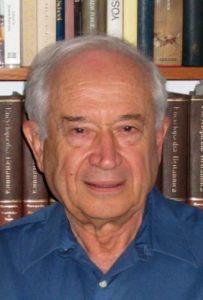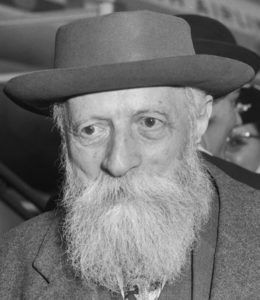“Godfather of THC”

Raphael Mechoulam
Raphael Mechoulam (b. 1930) was born in Bulgaria to a wealthy Sephardic-Jewish family. The family was forced to flee the country due to rampant anti-Semitism, ultimately surviving the Holocaust and settling in Israel in 1949. During his IDF service, Mechoulam worked as a chemical engineer and helped to develop insecticides. Falling in love with scientific research, he continued to study chemistry after his military service, earned his Master’s from the Hebrew University, then his PhD from the Weizmann Institute. After studies at the Rockefeller Institute in New York, Mechoulam returned to Israel to teach at both of his former universities. His primary field of research is cannabis. In fact, it was Mechoulam who first discovered, isolated, and synthesized THC, the primary active ingredient in cannabis. He would later discover and synthesize other important cannabinoids (a term he coined). Mechoulam was one of the pioneers of medicinal cannabis, and has said that medicinal cannabis could probably replace “ten to twenty percent of all pharmaceuticals”. More recently, he discovered endocannabinoids—molecules similar to THC that are naturally produced by the body, playing a key role in immunity and in regulating human emotions. All in all, Mechoulam published over 350 scientific papers. In 2016, he received a lifetime achievement award at Harvard’s School of Medicine. He was also the subject of an eye-opening documentary called The Scientist. Now a nonagenarian, Mechoulam continues to do research at his Jerusalem lab.
Words of the Week
Jewish time sees us as travellers on the road to a destination not yet reached; wayfarers on a journey begun by our ancestors, to be continued by our children.

 Adin Even-Israel Steinsaltz (1937-2020) was born in Jerusalem to parents who had made aliyah from Eastern Europe a decade earlier. His father was completely secular, and a devoted socialist who had fought in the Spanish Civil War on behalf of Communist International. Nonetheless, his father wanted his son to know what Judaism was all about, and made sure to have him tutored by a rabbi. Meanwhile, young Steinsaltz studied math and science at Hebrew University. He then took up rabbinical studies at Chabad’s Yeshivat Tomchei Temimim. After receiving semicha (rabbinic ordination), Steinsaltz tried to establish a neo-Hasidic community in the Negev, but was unsuccessful. He then became a school principal and, being just 24 years old, was the youngest principal in Israel’s history. In 1965, he embarked on a life-long journey to translate the Talmud into Modern Hebrew, along with composing a detailed commentary to explain its complexities. He finished the massive 42-volume set in 2010, after which it was translated into English, too, and shared freely online to make Talmudic learning accessible for everyone. Rabbi Steinsaltz also wrote profusely about topics that span the gamut of Judaism, including bestsellers on Kabbalah and Hasidism. Altogether, he penned over 60 books and some 200 other original texts of Jewish thought. (He even wrote an unpublished science fiction novel!) Meanwhile, Rabbi Steinsaltz helped found several yeshivas in Israel, as well as the Jewish University in Russia, with campuses in Moscow and St. Petersburg. He had spent several years in the former Soviet Union to help re-establish Jewish life there, and in 1995 was given the title of Russia’s duchovny ravin, the “spiritual head” of Russian Jewry. In 2004, a large gathering of rabbis in Israel sought to re-establish the ancient Sanhedrin. Rabbi Steinsaltz accepted the nomination to head the court, being given the title nasi, “president”. Before he suffered a stroke in 2016, he was known to regularly give classes until two in the morning. He spent time at Yale University as a scholar-in-residence, and received honourary degrees from five universities. Among his many awards is the prestigious Israel Prize. His motto was “Let my people know!” and he has been compared to a modern-day
Adin Even-Israel Steinsaltz (1937-2020) was born in Jerusalem to parents who had made aliyah from Eastern Europe a decade earlier. His father was completely secular, and a devoted socialist who had fought in the Spanish Civil War on behalf of Communist International. Nonetheless, his father wanted his son to know what Judaism was all about, and made sure to have him tutored by a rabbi. Meanwhile, young Steinsaltz studied math and science at Hebrew University. He then took up rabbinical studies at Chabad’s Yeshivat Tomchei Temimim. After receiving semicha (rabbinic ordination), Steinsaltz tried to establish a neo-Hasidic community in the Negev, but was unsuccessful. He then became a school principal and, being just 24 years old, was the youngest principal in Israel’s history. In 1965, he embarked on a life-long journey to translate the Talmud into Modern Hebrew, along with composing a detailed commentary to explain its complexities. He finished the massive 42-volume set in 2010, after which it was translated into English, too, and shared freely online to make Talmudic learning accessible for everyone. Rabbi Steinsaltz also wrote profusely about topics that span the gamut of Judaism, including bestsellers on Kabbalah and Hasidism. Altogether, he penned over 60 books and some 200 other original texts of Jewish thought. (He even wrote an unpublished science fiction novel!) Meanwhile, Rabbi Steinsaltz helped found several yeshivas in Israel, as well as the Jewish University in Russia, with campuses in Moscow and St. Petersburg. He had spent several years in the former Soviet Union to help re-establish Jewish life there, and in 1995 was given the title of Russia’s duchovny ravin, the “spiritual head” of Russian Jewry. In 2004, a large gathering of rabbis in Israel sought to re-establish the ancient Sanhedrin. Rabbi Steinsaltz accepted the nomination to head the court, being given the title nasi, “president”. Before he suffered a stroke in 2016, he was known to regularly give classes until two in the morning. He spent time at Yale University as a scholar-in-residence, and received honourary degrees from five universities. Among his many awards is the prestigious Israel Prize. His motto was “Let my people know!” and he has been compared to a modern-day  Mordechai Martin Buber (1878-1965) was born in Vienna to a religious Jewish family. His parents got divorced when he was just three years old, so Buber was raised in what was then Poland by his grandfather. Despite growing up in a richly Hasidic home, Buber began reading secular literature and returned to Vienna as a young man to study philosophy. Around the same time, he became active in the Zionist movement and soon became the editor of Die Welt, the main newspaper of Zionism. It wasn’t long before Buber became dissatisfied with the secularism and “busyness” of Zionism and returned (partially) to his Hasidic roots. He saw in Hasidic communities the right model for a new Israel, and a better alternative to the entirely-secular kibbutz. Buber ultimately saw Zionism not as a nationalist or political movement, but as a religious movement that should, first and foremost, serve to spiritually enrich the Jewish people—along with the rest of the world. He would later be credited with being the father of “Hebrew humanism” and “spiritual Zionism”. In 1908, he was invited to address a group of Jewish intellectuals known as the “Prague Circle”, and to “remind them about their Judaism”, as the group’s leader had requested. Among the members of the Circle was (former Jew of the Week)
Mordechai Martin Buber (1878-1965) was born in Vienna to a religious Jewish family. His parents got divorced when he was just three years old, so Buber was raised in what was then Poland by his grandfather. Despite growing up in a richly Hasidic home, Buber began reading secular literature and returned to Vienna as a young man to study philosophy. Around the same time, he became active in the Zionist movement and soon became the editor of Die Welt, the main newspaper of Zionism. It wasn’t long before Buber became dissatisfied with the secularism and “busyness” of Zionism and returned (partially) to his Hasidic roots. He saw in Hasidic communities the right model for a new Israel, and a better alternative to the entirely-secular kibbutz. Buber ultimately saw Zionism not as a nationalist or political movement, but as a religious movement that should, first and foremost, serve to spiritually enrich the Jewish people—along with the rest of the world. He would later be credited with being the father of “Hebrew humanism” and “spiritual Zionism”. In 1908, he was invited to address a group of Jewish intellectuals known as the “Prague Circle”, and to “remind them about their Judaism”, as the group’s leader had requested. Among the members of the Circle was (former Jew of the Week)